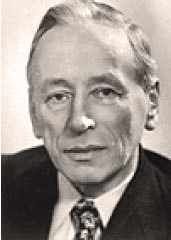Frits Zernike
Frits Zernike

Frits Zernike was born in Amsterdam, 16 July 1888. He inherited his passion for physics from his father; as a boy he already possessed an arsenal of pots, crucibles, and tubes, which he scraped together with his own pocket money, or received as gifts from understanding manufacturers. He devoted all his spare time to experiments.
Zernike entered the University of Amsterdam in 1905, majoring in chemistry, and minoring in physics and mathematics. His work on opalescence in gases earned a gold medal from the Dutch Society of Science in 1912. In 1913 Jacobus Kapteyn, a famous astronomy professor at Groningen University, invited him to be his assistant. After two years Zernike got his first university teaching post, not in astronomy, but as a lecturer in mathematical physics at Groningen, where he was made a full professor in 1920.
His papers on statistics include a paper with J.A. Prins, introducing the g-function for the correlation of the position of two molecules in a liquid, an extensive article in the Geiger and Scheel handbook, and an approximation method in the order-disorder problem. He developed a sensitive galvanometer and beginning in 1930 focused on optics, developing phase contrast, and writing about imaging errors of the concave grating and on partial coherence. With the collaboration of his students he solved the problem of the influence of lens aberrations on the diffraction pattern at a focus.
Zernike’s great discovery of the phase-contrast phenomenon, which he discovered one evening in 1930 in his totally blackpainted optical laboratory, did not immediately receive the attention. The Zeiss factories at Jena completely underestimated the value of his phase-contrast microscope. However, when the German defense forces took stock of all inventions which might serve in the war in 1941 the phase-contrast microscope was at the top of the list. After the war, other firms also took up the production of many thousands of phase-contrast microscopes.
For his phase-contrast research Zernike received the Nobel Prize in 1953. His achievements were also recognized by the Royal Microscopical Society, and the Royal Society (London). He was awarded an honorary doctorate in Medicine from the University of Amsterdam.
Zernike died in 1966.
Document Created: 26 July 2023
Last Updated: 28 August 2023
